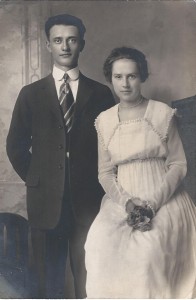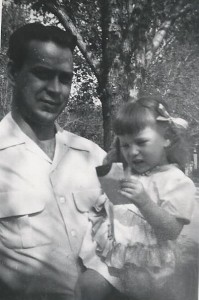I adored my father. He died somewhat unexpectedly and suddenly 33 years ago. I was blessed to share a restaurant meal with him in College Park, Maryland, earlier in the evening on the night he left us. Harold Robert Stewart reached the age of 64 years looking forward to retirement once the Social Security he paid for over 40 years kicked in. One of the first political instructions “Daddy” shared with me was that Social Security was the salvation of a working poor man like himself. He said that was why he was and would always be a Democrat. Harold had been a child in the Great Depression, losing his mother at age 3 to childbirth. As a young child, he was sent to live with his father’s sister until his “Dad” remarried. Happy to reconnect with his father, he faced some normal challenges in his adolescence adjusting to a new step family. His parental reunion was then tragically cut short. Fred C. Stewart died suddenly at work one day when his oldest son was 15 years old.
 Fred C. Stewart and Bertha Tams Stewart
Fred C. Stewart and Bertha Tams Stewart
Losing his parents early in life left an indelible imprint on Harold who became a soft hearted and devoted family man. He worked very hard and enjoyed a “few” beers at home in the evening. He wanted and needed to be at home with his family, particularly when his children were young. He was always the parent whose unconditional love I never doubted even when my behavior or life direction disappointed him. He was a man of few words, and this may be why I remember every moral lesson he ever gave to me. His guiding life principle, which he shared with me throughout my life was: “2 wrongs do not make a right!” In my specific case, “Janny, 2 wrongs do not make a right.” Later I heard, “Jan, remember 2 wrongs don’t make a right.”
This simple and profound parental guidance has helped me resolve many moral questions I have faced or pondered on my life’s journey. It has joined some other wise teachings discovered in adulthood.”Our prime purpose in this life is to help others. And if you can’t help them, at least don’t hurt them.” H.H. the 14th Dalai Lama.
MY NEBRASKA VALUES
Society poses some difficult questions needing policy resolution. This is always an opportunity to find consensus or discover a compromise that divergent interests can agree to accept. In such matters leadership really matters. In our politically polarized and special interest funded nation, we struggle with this.
The Death Penalty is one issue that comes to our government policy makers on a regular basis. The Nebraska Unicameral is considering legislation now. A lot of reasons to abandon the Death Penalty naturally present themselves; moral, practical, economic, legal, etc. Our state, however, still appears to be very divided on the issue. Anyone who is interested, and I do think we all could try to be, can find countless sources of information, analysis and discussion. My own ruminations certainly consider if rationality and logic alone point humanity towards a “tipping point”abolishing this form of punishment.
As always, I reflect on the personal journey that brings me to this crossroads. The Protestant denomination of my upbringing has advocated for abolishing the Death Penalty for over 50 years. Not surprisingly if you have been reading this blog, I only discovered this fact 2 years ago. One of the practices I really admire in the Episcopal church is the content and tone of the sermons. The sermons I experienced have not been at all preachy. They did not focus or lecture on politically divisive moral issues. It seems to me that the congregation is free to study and reflect as individuals. We can read The Bible and Book of Common Prayer, and clergy is available to counsel parishioners who struggle with spiritual choices.

My first introduction to the Death Penalty arose on June 25, 1959. Charles Starkweather, age 20 years, was executed by electric chair in Lincoln, Nebraska. He had been convicted of First Degree Murder having killed eleven people during a road trip/killing spree with a teenage girlfriend. The couple were arrested on January 29, 1958. Until the very day he was executed, the story of his violent crimes, trial, appeals, etc., had not really registered on my childhood radar screen. (My parents were pretty careful not to discuss disturbing information in the presence of their 2 daughters.) When the news of the execution came over the radio, I was surprised to hear some cheers in a home where I was visiting. My surprise is likely explained by feelings of cognitive dissonance. I had learned of The Ten Commandments; most likely through a synergy between Charlton Heston and Vacation Bible School. Celebrating the death of another human being just seemed in conflict with my almost10 year old understanding of morality.
I have previously explained, in some detail, how my values are closely connected to movies and T.V. entertainment watched in the 1950s, 1960s and 1970s. My parents both worked in a small town movie theater in Fairfield, Iowa, where our family lived for 2 years. My younger sister and I watched a lot of movies while Mom and Dad were working. One specific memory connects to the Death Penalty.
Actress Susan Hayward won an Academy Award for a 1958 movie “I want to Live!” This film was based upon a true story of Barbara Graham who was executed in the California gas chamber in 1955. Coincidentally, this film was shown on cable this past week. I also noted a documentary airing on Nebraska public television. I have these recorded on DVR to watch later. It’s intriguing how these “coincidences” occur. When I was younger I suspected I was clairvoyant. Now, I more maturely understand that when I am reflecting on issues of the day, other entities are doing the same. Anyway, I vividly remember that the Hayward movie trailer left troubling impressions before I even experienced the film sometime in the 1960s. A few things caught my attention. I was shocked to see a woman behaving in the indecent, unscrupulous and aggressive manner portrayed. The possibility that a woman could be executed for a crime honestly stunned me! Socialized gender roles of the day sort of assumed that a “lady” would not commit the various crimes depicted. Furthermore, I clearly understood that “gentlemen” should never strike a woman, much less execute her. Men were seen fighting and punishing others in movies and T.V. all the time. Apparently this was expected. Needless to say, I have since learned otherwise in many respects.
 FLOOR OF THE NEBRASKA LEGISLATURE
FLOOR OF THE NEBRASKA LEGISLATURE
Photo courtesy of “Nebraska Unicameral Information Office”
There is vocal and intransigent opposition to sentencing reform that has, to date, governed here in my home state. Recent debates have shown a fascinating contrast in decision making styles. One of my Social Work fueled observations boils down to what looks a lot like personality differences. Some of the vocal opponents to abolition of the Death Penalty, and the elected representatives who passionately argue this point of view, reflect what I have learned to be “authoritarian personality.”
A dictionary definition of authoritarian personality would be: a cluster of personality traits reflecting a desire for security and order (e.g., rigidity, unquestioning obedience, scapegoating, desire for structured lines of authority.) Medical Dictionary for the Health Professions and Nursing © Farlex 2012. I studied both psychology and therapy as a Social Work student. Following my studies, I dove headfirst into a reflection of religious dogma and traditions. I discovered that many spiritual paths were congruent with the Social Work principles I had learned. One of the touchstones I found along the way was – – Control is an Illusion.
News reports of recent Death Penalty debates at the Nebraska Unicameral likely reveal something about our collective stage of development. I live in Legislative District 15 encompassing Dodge County, Nebraska. We have a brand new State Senator appointed to fill a vacancy arising when our sitting senator was elected to higher office. (With all due respect, please consider the circumstances of a “New Age” of low information voters, and the perennial support for a straight Republican ticket on Nebraska politics.) Recent news has illustrated to me, that in several instances, my newly anointed legislator has not met my inclinations on issues I care a great deal about. In opining on the Death Penalty, he lectured his colleagues and constituents on religious authority, which he presumably believes to be the only governing “Truth.” He also read an account of a particularly gruesome crime. This illustrates to me, aspects of an of authoritarian mindset and a misunderstanding of social comportment and sensibilities. See, Senator Schnoor, L.B. 268, Day 65 Floor Debate April 16, 2015.
When a convicted criminal has committed a particularly heinous and depraved crime, should our only focus be judgment and punishment of the crime and perpetrator? Is there anything else of crucial importance to consider in deciding public policy?
It occurs to me, that humanity is not competent or expected to handle all moral complexities. We are an imperfect species prone to bias and mistakes. We also harshly scorn and even hate others who disagree with us. We sometimes try to take legal rights away from those who offend our personal beliefs. This is not the best way to govern. We have other important considerations to weigh. What does imposing the Death Penalty say about our democratic society? I see much inhumanity in the execution protocols and processes. I also fear confusion, mixed messages and misunderstanding. Our exercise of government authority speaks to us all, including children who will choose our future’s trajectory. How will the status quo affect us? I appreciate that many look to a higher power for pronouncements on human transgressions. Should our own religious beliefs and faith impose consequences when human judgment so clearly fails us? I am hopeful that Nebraska will join the other states and countries around our planet who have abolished the Death Penalty. If our Criminal Justice system is not working as hoped and needed, I believe we should at least try to fix it.
